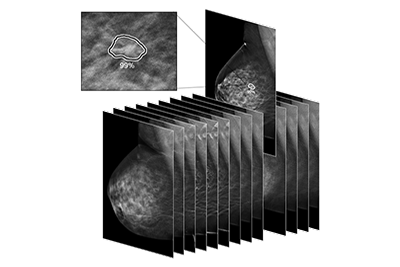
May 16, 2022 — iCAD, Inc., a global medical technology leader providing innovative cancer detection and therapy solutions, today announced that promising clinical research supporting ProFound AI® Risk for Digital Breast Tomosynthesis (DBT) – the world’s first clinical decision support tool that provides an accurate short-term breast cancer risk estimation based on age, breast density and mammographic features – was recently published in the peer-reviewed journal, Science Translational Medicine.[iv]
In the study, which involved 154,200 women screened at four participating U.S. screening sites[v] using DBT from 2014-2019, researchers at the Karolinska Institutet in Stockholm, Sweden found ProFound AI Risk accurately determined women who were at a higher risk of developing breast cancer, with an area under the receiver operating characteristics curve (AUC) of 0.82iv, (95% CI 0.79-0.85). AUC is a standard performance measurement for examination procedures that incorporates sensitivity and specificity into a single metric of overall performance. This data supports iCAD’s internal research, which previously found ProFound AI Risk for DBT offers an AUC of 0.80 (95% CI 0.76, 0.83).[vi]
“iCAD’s Breast AI Suite offers a complete portfolio of unrivaled breast cancer detection, density assessment, and short-term risk evaluation AI solutions, and we are pleased to see this compelling data further validate the clinical value of ProFound AI Risk, the latest addition to our breast AI portfolio,” said Stacey Stevens, President and CEO of iCAD, Inc. “Physicians have traditionally estimated breast cancer risk by examining the patient’s known risk factors, such as family history, but about 85% of breast cancers occur in women who have no family history of breast cancer.[vii] Additionally, traditional long-term risk models may not be as accurate at estimating a woman’s risk of developing breast cancer, as their average AUC is around 0.60.[viii] ProFound AI Risk offers a more individualized approach, as it includes a woman’s mammography images and focuses on one-to-two-years in the future, which provides critical information that can help clinicians personalize breast cancer screening regimens for patients based on their individual risk of developing cancer before or at their next screening.”
Established lifestyle-familial risk models, such as Tyrer-Cuzick and Gail, are currently used in the U.S. to identify women with a greater than 20% lifetime risk of developing breast cancer who could be offered breast magnetic resonance imaging (MRI) as a supplemental screening modality for breast cancer detection.iv However, these long-term risk models can result in a high number of false positives due to low-to-moderate discrimination performance.[ix] ProFound AI Risk complements traditional risk models and is easy for clinicians and medical facilities to adopt, as it only requires the images from a 2D or 3D mammogram, with no questionnaires, portals, or staff required to implement.
Using U.S. guidelines, the researchers determined that 14% of the women studied were at high risk after a negative or benign screening, with an almost 20-fold higher risk of developing breast cancer, compared to the general risk population. In this high-risk group, 76% of stage II or later cancers, 59% of stage 0, and 58% of stage 1 cancers were observed.
Researchers estimated if the 12% of women at highest risk had been offered supplemental screening based on the ProFound AI Risk for DBT model, up to 59% of the cancers could have potentially been detected, compared to 24% of the cancers using Tyrer-Cuzick. This corresponds to 2.4 times higher sensitivity than Tyrer-Cuzick.
“Our research showed that women who ProFound AI Risk determined to be at high risk were more likely to present with later stage tumors than early-stage cancers,” according to lead author of the study, Mikael Eriksson, PhD, Karolinska Institutet. “It is known that breast cancer survival is four and 12-fold worse for stage II and III cancers compared to stage 0 and I cancers in the first four years after diagnosis. Furthermore, the treatment cost for stage II and III cancers is more than twice that of stage 0 and I cancers in the first 24 months after diagnosis. ProFound AI Risk offers the potential to aid radiologists in refining personalizing screening recommendations and discussing risk with women, which could in turn influence their screening regimen compliance and potentially lead to earlier detection, reduced treatment costs and improved outcomes.”
“Earlier cancer detection can have a tremendous impact on women, from treatment to outcomes. And because women are often caretakers, improving outcomes in women’s health can also have cascading benefits for children, families, and communities,” added Stevens. “Only iCAD’s Breast AI suite provides clinicians unprecedented insights into each patient’s present and future, which offers the potential to transform the trajectory of a woman’s outcome and life.”
For more information: www.icadmed.com
References:
[i] Eriksson, M et al. A risk model for digital breast tomosynthesis to predict breast cancer and guide clinical care. Science Translational Medicine. 14 (644). 2022 May 11. Accessed via https://www.science.org/doi/10.1126/scitranslmed.abn3971.
[ii] Breastcancer.org. U.S. Breast Cancer Statistics. Accessed via https://www.breastcancer.org/symptoms/understand_bc/statistics.
[iii] Participating U.S. screening sites: Boca Raton Regional Hospital, Boca Raton, FL; Elizabeth Wende Breast Care, Rochester, NY; Larchmont, NJ; Zwanger-Pesiri Radiology, Lindenhurst, NY.
[iv] Eriksson, M et al. A risk model for digital breast tomosynthesis to predict breast cancer and guide clinical care. Science Translational Medicine. 14 (644). 2022 May 11. Accessed via https://www.science.org/doi/10.1126/scitranslmed.abn3971.
[v] Participating U.S. screening sites: Boca Raton Regional Hospital, Boca Raton, FL; Elizabeth Wende Breast Care, Rochester, NY; Larchmont, NJ; Zwanger-Pesiri Radiology, Lindenhurst, NY.
[vi] iCAD data on file. Variations per vendor and population may occur. ProFound AI Risk is a clinical decision support tool. Information is reviewed by the physician. All care decisions are up to physicians.
[vii] Breastcancer.org. U.S. Breast Cancer Statistics. Accessed via https://www.breastcancer.org/symptoms/understand_bc/statistics.
[viii] Eriksson M, Czene K, Strand F et al. Identification of Women at High Risk of Breast Cancer Who Need Supplemental Screening. Radiology. 2020 Sept 8. Accessed via https://doi.org/10.1148/radiol.2020201620.
[ix] M. H. Gail, R. M. Pfeiffer, Breast cancer risk model requirements for counseling, prevention, and screening. J. Natl. Cancer Inst. 110, 994–1002 (2018).


 February 06, 2026
February 06, 2026 









